In today's busy world, being able to sleep well has become very difficult; having good quality sleep ended up at the bottom of the priority list, behind work, housework, leisure and recreation.
Sleeping is an essential need, but there are also many myths about sleep, let's discover them together!
Index
Adults need 8 hours of sleep every night
Getting enough sleep is very important for health and well-being; allows the body to rest and regenerate in view of the efforts of the day.
Eight hours of sleep is the commonly accepted goal for adults, but not everyone is the correct amount of sleep; women sleep on average 7 hours a night, while men 6 hours and 45 minutes.
Your sleep needs can change every day, based on factors such as stress, the amount of hours you slept the previous nights, and daily efforts.
Time in bed = time you actually sleep
Many people think that if they go to bed at 23pm and then get up at 7am they sleep 8 hours; unfortunately this is not the case!
Staying in bed for 8 hours probably means sleeping about 6 and a half hours; minor body movements and periods of wakefulness can amount to at least an hour of lost sleep each night.
We recommended some stretching exercises to do before bed to improve sleep quality. Don't miss it!
Waking up in the middle of the night is abnormal
If sleeping continuously is everyone's goal, it is more than normal for even the best dorms to wake up at night and stay awake for short periods of time; awakenings can be exacerbated by noise, light, partner's movements, etc.
There is scientific evidence that our ancestors spent several hours of the night awake; they had a first sleep, then a 1-2 hour pause awake and finally a second sleep.
The most important thing is how many hours you sleep
The amount of hours you sleep is certainly important, but also the quality of sleep is essential for health; health problems such as apnea and insomnia can cause disruptions in the sleep cycle.
Even when the desired hours of sleep are reached, you can still feel tired and not rested if your sleep cycles have often been interrupted.
You can't make up for lost sleep
It happens to everyone to spend a bad night in white looking at the clock; when you sleep little for a long time, your body begins to accumulate sleep debt, that is, the need for extra hours of sleep caused by the lack of this in the previous nights.
Naps can help you catch up on lost sleep, but there won't be many benefits if they affect the quality of your night's sleep.
Un 90-minute nap is ideal for doing all stages of the sleep cycle, light, deep and REM, and help you feel refreshed.
Watching TV or your smartphone before bed helps you sleep
Having your own pre-sleep routine helps activate sleep hormones, but this shouldn't include a TV or smartphone; in fact, the electronic blue light negatively affects the human circadian rhythm.
Alcohol before bed helps you sleep
Drinking alcohol causes drowsiness, but it certainly does not help to have a quality sleep; the sedative effect of alcohol prevents you from reaching the restorative stages of sleep, as the body works to process alcohol in the body.
How many hours a night do you sleep and above all how? Let us know in the comments!
Anyway, we have activated a lot of discounts on our Telegram Fitness & Sport channel: from 30 to 70% on all sports categories! Find it all here
SUBSCRIBE TO THE FITNESS & SPORT CHANNEL

